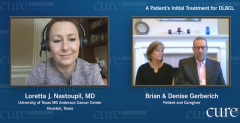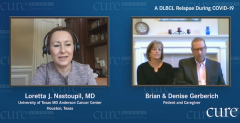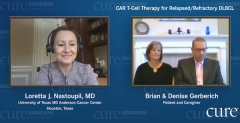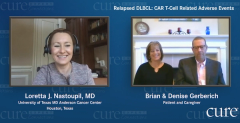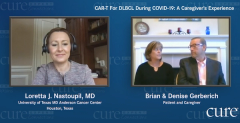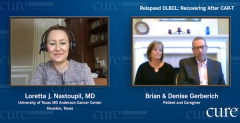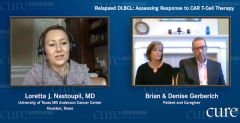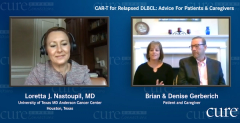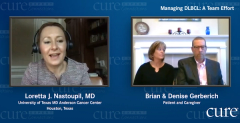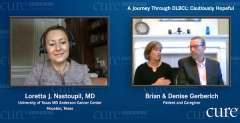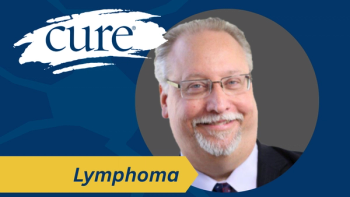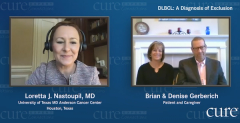
A Diagnosis of Exclusion
Episodes in this series

Loretta J. Nastoupil, MD: Hello, and welcome to CURE Expert Connections®. I am Loretta Nastoupil from the University of Texas MD Anderson Cancer Center, and I’m joined today by one of my patients, Brian, and his wife, Denise. Brian is going to share his story of diffuse large B-cell lymphoma, including diagnosis up through treatment, alongside his wife, Denise. Welcome, Brian and Denise.
Denise Gerberich: Thank you.
Brian Gerberich: Good to be here.
Denise Gerberich: Good to be here.
Loretta J. Nastoupil, MD: I’m going to start with giving a brief overview of diffuse large B-cell lymphoma. Brian, you’ve been diagnosed with diffuse large B-cell lymphoma. This is our most common lymphoma subtype. When I meet patients in the clinic, I make a point to let them know there are 60 different types of lymphoma. Though we use the term non-Hodgkin lymphoma frequently, it’s probably a disadvantage for patients and providers because that encompasses everything that’s not Hodgkin lymphoma.
Once again, diffuse large B-cell lymphoma is our most common subtype. Oftentimes we think of it as being curable with standard treatment, but you’ll hear Brian’s story; that’s not true for all patients. The most important thing is recognizing that there may be many treatment options available for patients, and there’s generally not a one-size-fits-all.
But the point of today’s video is to walk you through one person’s journey and how they’ve been a part of some of the latest treatment breakthroughs, and what that was like both from an adverse effect standpoint and also from his family’s standpoint, watching him go through this process.
Brian, please walk us through your initial diagnosis.
Brian Gerberich: It started about five and a half years ago. I had a pain in my side, which I understand that’s not always the case that you actually feel something, but I did have some discomfort in my side. Went to my primary care physician, and he decided to do a sonogram just to be safe.
The sonogram showed some tumors around my liver, and that started the ball rolling. I ended up going to a liver specialist in our hometown, and she did a biopsy. It was a very difficult diagnosis once we got the biopsy. It took weeks if not months to get a return on the biopsy for the diagnosis.
The initial diagnosis, we went back to the liver doctor and she said, “I’m sorry, you have liver cancer.” They continued to do some more research, endoscopy and colonoscopy, and then she came back and said, “Well, good news, it’s not liver cancer, but it’s colon cancer.”
We did some more testing and more biopsies, a lymph node biopsy, and then they came back with the diagnosis of lymphoma. It was an interesting journey to get to that point. It took us a while, but that’s what they finally diagnosed me with.
Loretta J. Nastoupil, MD: What were your thoughts when they told you that you had lymphoma?
Brian Gerberich: My dad had actually died of pancreatic cancer and that thought, being in a major organ, concerned us. With quick research, we saw there was a lot of hope with lymphoma treatments. We were actually almost relieved after getting other diagnoses.
Loretta J. Nastoupil, MD: Denise, what was your experience through this process?
Denise Gerberich: Just hearing the word “cancer” was devastating to me, especially because he’d always been super healthy, not sick at all. We almost joked that he was super healthy except for the cancer, which was definitely a shock.
I think the hard part, while they were trying to determine the diagnosis and the actual lymphoma that he had and the treatment plan, it was hard waiting because he was deteriorating before my eyes. He was losing a ton of weight all of a sudden, he would have the high fever and the chills every night, and he was just so sick, and I felt helpless because I couldn’t help him. As the wife and mother and female of the family, it was like my nurturing instinct, I wanted to fix things, and that was definitely out of my hands.
Loretta J. Nastoupil, MD: I’ll briefly summarize this presentation. Diffuse large B-cell lymphoma is oftentimes a lymphoma that is associated with symptoms such as weight loss. Occasionally you’ll have pain where the lymph nodes or the masses are growing. If it’s in the abdomen, it’s not uncommon for patients to present with some abdominal discomfort.
As you witnessed, patients can deteriorate very quickly while we’re trying to derive a diagnosis. It’s almost a diagnosis of exclusion, unfortunately, because it’s so uncommon. Having a skilled hematopathologist who eventually gets the sample will finally result in a diagnosis.
Transcript Edited for Clarity

